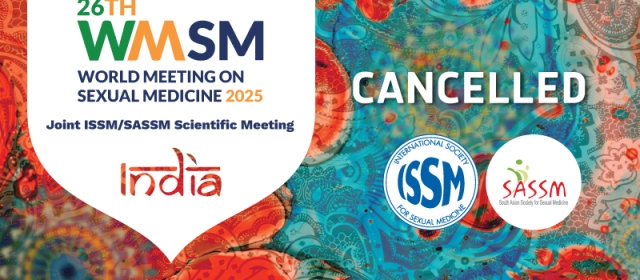
All News
Upcoming Events

To our members, colleagues, and partners in sexual medicine,
It is with great regret that the International Society for Sexual Medicine (ISSM) and the South Asian Society for Sexual Medicine (SASSM) announce the cancellation of the World Meeting on Sexual Medicine (WMSM) 2025, which was scheduled to take place from September 11-14, 2025, in Bangalore, India.
This decision follows extensive discussions between the ISSM and SASSM leadership, as well as members of the WMSM Steering Committee. While all parties remained fully committed to delivering a high-quality scientific meeting in the region, the recent escalation of geopolitical tensions and the ongoing conflict between India and Pakistan have created a deeply uncertain environment for international collaboration. These circumstances have led to a significant reduction in anticipated delegate participation and sponsor support and ultimately compromised our ability to ensure a successful and inclusive global meeting.
The safety of our members, faculty, and partners has always been our top priority. ISSM and SASSM explored all possible alternatives to preserve the meeting, but we have jointly concluded that cancellation is the most responsible course of action under the current conditions.
We recognize and sincerely regret the inconvenience this may cause to those who had already planned to attend or contribute to WMSM 2025. All registered participants, sponsors, faculty, and abstract submitters will be contacted directly with further information regarding next steps, including details on refund procedures where applicable.
Despite this disappointing outcome, ISSM and SASSM remain committed to continued collaboration in the region and to advancing sexual medicine worldwide. We thank everyone who has supported the preparations for WMSM 2025. We look forward to welcoming the global community at the next World Meeting on Sexual Medicine, which will take place in Porto, Portugal on February 25-28, 2026.
For questions or further information, please visit https://issmsassm2025.org or contact the ISSM Meeting Office at
Best regards,
Dr. Run Wang
President
International Society for Sexual Medicine
Assoc. Prof. Mohammad Shamsul Ahsan
President
South Asian Society for Sexual Medicine


Emergency contraception consists of hormonal medications or other methods that can be taken to help prevent pregnancy in the case of unprotected intercourse, birth control failure, or non-consensual intercourse. There are several types of emergency contraception offered by healthcare services and recommended by global health organizations.

Active surveillance (AS) refers to a low-risk, localized prostate cancer management technique, which involves monitoring the disease through prostate-specific androgen (PSA) tests, digital rectal exams, multiparametric MRIs, and biopsies. This technique minimizes complications associated with surgery and radiation, such as erectile dysfunction and incontinence, as surveillance can help detect disease progression early on. It’s estimated that one in six men will develop prostate cancer at some point in their lifetime.
Other conditions also tend to affect this population of men, such as hypogonadism, which can be explained as low testosterone levels. Low testosterone affects roughly 40% of men over the age of 45. Normally, testosterone replacement therapy (TRT), is the preferred treatment for managing hypogonadism. However, this may be avoided for those on AS for prostate cancer due to a belief that higher testosterone levels may contribute to the progression of prostate cancer. Nevertheless, recent research on the androgen saturation model suggests that prostate cancer progression is more likely at lower testosterone levels and less likely at higher levels.
Between 2009 and 2023, researchers at the Scott Department of Urology at Baylor College of Medicine in Texas aimed to evaluate the effects of TRT and prostate cancer progression in men on AS. They also hoped to contribute to the lacking available literature by providing clarity regarding the feasibility of TRT in these men.
A total of 43 men with a median age of 62 with a prostate cancer diagnosis were evaluated over at least a 12-month period while undergoing TRT. The average evaluation period was around 73 months. Of these men, 32 (74.4%) followed through with the evaluation period, five (11.6%) stopped because they felt they no longer needed TRT, three (7%) stopped due to cancer progression following biopsy, and one (2.3%) stopped due to an unrelated hospitalization.
Prior to starting TRT, the median testosterone serum level of the group was 272 nanograms per deciliter (ng/dL), and when measured after the start of TRT, that median level had jumped to 578.5 ng/dL. Seven men (16.3%) had testosterone levels below 250 ng/dL, which is the low testosterone threshold proposed by the androgen saturation model. All 43 men had normal testosterone levels (above 300 ng/dL) following the start of TRT.
Additionally, the median PSA level prior to starting TRT was 2.8 nanograms per milliliter (ng/mL), while after starting TRT the PSA levels dropped to 2.6 ng/mL, which researchers found to be an insignificant difference. However, seven (16.3%) of patients demonstrated a PSA increase of at least 1 ng/mL, and three of these seven patients had an elevated baseline PSA level of 3.5 ng/mL. Researchers believe that while PSA level increase with TRT is generally insignificant toward disease progression, elevated baseline PSA levels may be a risk factor for prostate cancer progression. This is in line with the androgen saturation model, in which higher testosterone levels are thought to be less likely to lead to disease progression.
Biopsy results were only available for 15 patients prior to and following the start of TRT. Of these 15 patients, 12 (80%) demonstrated no disease progression after an average of 44.28 months, three (20%) demonstrated an increase following an average of 79.5 months, and two (13.3%) had benign biopsy after an average of 9 months. One of these individuals had normal tissues after 12 years of TRT, while the other had normal tissues after 11 months. This data aligns with existing literature about prostate cancer, regardless of TRT.
Conclusion
Overall, results reflect the androgen saturation theory, which suggests that testosterone regulators (androgen receptors) are maximally saturated and able to function properly at a testosterone concentration of 240-250 ng/dL. In this study, only seven (16.3%) of men had baseline testosterone levels below this threshold and a significant increase in PSA following TRT. The other 83.7% had baseline testosterone levels above this threshold and virtually no significant increase in PSA levels following TRT.
Despite a small sample size and lack of generalizability, this study is still the largest retrospective single-center study of its kind. This allows future research to expand and specialize, focusing on larger patient groups and subgroups to fully understand the effects of TRT on the risk of prostate cancer progression.
Researchers say the results of this study contribute to existing evidence that TRT may be safe for men with low testosterone levels on AS for prostate cancer.
References:
- Applewhite, J., McCarter, J., Saffati, G., Kronstedt, S., Hinojosa-Gonzalez, D., La, T., Diejomaoh, R. M., Lipshultz, L. I., & Khera, M. (2025). Testosterone replacement therapy in men on active surveillance for prostate cancer. The Journal of Sexual Medicine, 22(3), 432–438. https://doi.org/10.1093/jsxmed/qdaf003

A.D.A.M., or Androgen Deficiency in the Ageing Male, has been equated to the male version of menopause. However, there are quite a few differences between A.D.A.M. and menopause. For example, menopause is often sudden, typically within the first 12 months after the end of ovulation and an almost immediate drop in estrogen after perimenopause, where estrogen loss is more gradual. Whereas A.D.A.M. is a more gradual reduction of testosterone over time due to an imbalance in the hypothalamic-pituitary-testicular axis, the part of the brain and related system that regulates male reproductive function.
In this episode with guest Remziye Kunelaki and host Shelly Varod, we explore the nuanced world of sex therapy for LGBTQIA+ individuals. From the unique challenges and sexual dysfunctions, they face to the impact of stigma, discrimination, and minority stress on their sexual health. We also discuss the importance of inclusive training for sex therapists, and common misconceptions that still persist about sexual health.

Introduction
An inflatable penile prosthesis (IPP) is a permanent device that can be used to correct erectile dysfunction. However, despite constantly advancing surgical techniques, infection is still possible. This would require the removal and replacement of the device and is naturally a dreaded complication.

The ISSM is pleased to share the publication of a new article developed by the 2023–2024 Young Researchers Committee: "Perceptions and Attitudes Toward Sexual Norms: Key Insights from the International Society of Sexual Medicine Young Researchers Committee Survey."
The article has now been published in Sexual Medicine Open Access and is the result of a joint effort by the entire committee during their term.
We congratulate the committee on this achievement and extend special thanks to ISSM members Andrea Salonia, Bruno Nascimento, and Edoardo Pozzi, who finalized the manuscript.

Gender-affirming surgery is available to support transgender individuals in aligning their physical characteristics with their gender identity and alleviating gender dysphoria. Gender dysphoria occurs when an individual feels distressed by a disconnect from their own body due to their gender identity not aligning with their sex assigned at birth. For transgender women, gender-affirming surgery may consist of breast implants, facial feminization surgery, or vaginoplasty, and often all of them together.

A fear of semen may be attributed to several other conditions. One common reason is related to obsessive compulsive disorder (OCD). Specifically, the contamination subcategory of OCD, in which obsessions (unwanted thoughts, feelings, urges, etc.) and compulsions (actions taken to relieve distress from obsessions) center on germs, illness, or contamination. These compulsions are fueled by disgust, which is a defensive reflex the body uses to avoid contamination. However, with OCD, that disgust is exacerbated by obsessions.

Circumcision, where the foreskin of the penis is surgically removed, is an extremely common procedure performed in both pediatric and adult urology practices. Outside of religious reasons (common among pediatric patients), adults may choose to be circumcised for a variety of other reasons such as visual aesthetic, penile cancer, and to prevent infections.

Intersex is a term that refers to individuals that were born with genitalia, chromosomes, or hormonal imbalances that fit outside of the sexual binary of male and female. For example, an individual may have genitals that are associated with being female, but at the same time have an internal reproductive system or hormones associated with being male, such as hidden testes and testosterone. They may also have variations in chromosomes, such as XXY (as opposed to the male XY and female XX), or a mix of XY and XX throughout cells, or just one X chromosome. Intersexuality does not always present at birth, and may show during puberty, adulthood, or sometimes not at all.

Urinary tract infections (UTIs) occur when bacteria enter the urinary system through the urethra and spread to the bladder. Most UTIs remain in the bladder, but if they reach the kidneys, it can become a more serious health concern. Common symptoms include a burning sensation while urinating (dysuria), cloudy or pink urine, and frequent urges to urinate, regardless of bladder fullness. Over half of all women will experience at least one UTI in their lifetime, and up to 2.8% will develop recurrent UTIs (rUTIs), defined as three or more UTIs in a year or two or more within six months. Roughly 60% of rUTIs are linked to sexual activity, which may introduce bacteria into the urethra, while others result from hormonal changes due to menopause.

